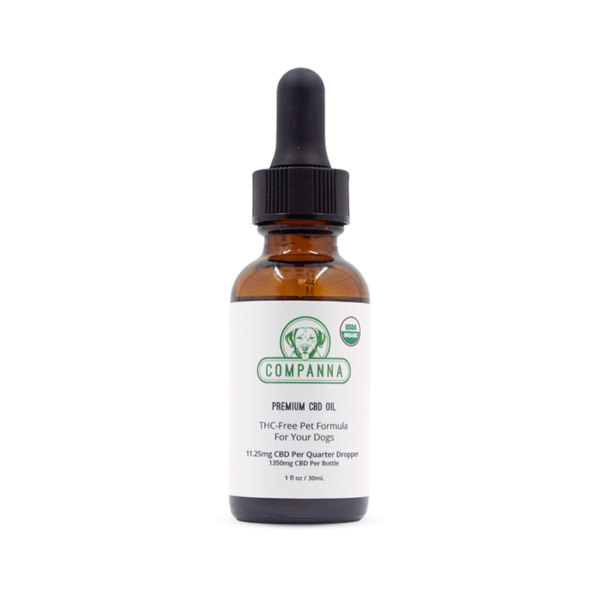Is CBD Effective for Dogs?
Cannabinoids are chemicals similar to endocannabinoids that are produced in all vertebrates and mimic them. Endocannabinoid receptors can be found throughout the body. The endocannabinoids serve as master regulators, signaling other systems when to speed up or slow down in order to maintain the body and return it to equilibrium. Cannabinoids from the cannabis plant affect these same receptors in different ways. THC generates a euphoric sensation, whereas CBD does not. Is CBD oil effective for dogs?
Is It Dangerous?
The most severe CBD has been shown to cause loose stools and modest changes in some liver enzyme values after several weeks, but it is not known to be poisonous or deadly to dogs when ingested at human dosages. THC, on the other hand, can cause toxicity and even mortality in dogs if given at prescribed doses. The main issue with CBD is that it inhibits a chemical in the body called cytochrome P450, which is involved in the metabolism of most medicines. CBD oil for dogs might make medicine less effective if its effectiveness depends on its metabolized product. CBD may increase the levels of a drug to toxic proportions if its safety is contingent on it being removed from the body within a specific time frame. If your dog is taking other medications, do not give him CBD without your veterinarian’s consent.
Is It Effective?
There’s a lot of work to be done in terms of studying canine interaction, but there’s an enormous amount of research (about 23,000 papers!) looking at CBD’s influence on laboratory animals and humans with encouraging results for pain, especially arthritic discomfort, itchiness, anxiety, and cancer. What are the findings in dogs? The following is what has been disovered.
Arthritis: CBD has been studied for the treatment of arthritis pain in several studies, all of which show positive outcomes. In a study published in the Journal of Veterinary Internal Medicine, dogs given CBD at a dosage of 4.4 mg per kg twice daily for a month experienced significant pain alleviation and quality-of-life improvement. Some dogs were so debilitated that their owners considered euthanasia, but after just days on CBD, they were walking and even climbing stairs, according to the study’s lead investigator Joe Wakshlag, DVM, Ph.D., DACVN. According to research published by Baylor University, CBD performed similarly. When used in a liposomal formulation, it was even more effective.
Itchiness: CBD has been found to significantly decrease itching in two double-blind, placebo-controlled dog studies. After eight weeks of treatment, CannPal’s CBD product reduced itching, inflammation, and skin disorders by 51 percent in an Australian study conducted by the firm. ElleVet’s CBD+CBDA product, which combines CBD with CBDA, was found to significantly reduce owners’ complaints of itching in a research conducted by the firm ElleVet.
Cancer: Cannabinoids are said to cause cancer cell death and the inhibition of metastasis. CBD, alone or in combination with a commonly used chemotherapy drug, was found in a Cornell University study to reduce cancer cell proliferation in vitro more than the chemotherapy drug alone, according to researchers at Cornell University. According to anecdotal claims from veterinarians, CBD has been said to counteract cancer in dogs.
Behavior: Anxiety and especially noise sensitivity are common reasons why dog owners seek help using CBD. However, despite anecdotal evidence of its efficacy, no well-controlled study has yet shown it to be highly beneficial. The University of Western Australia recently published a study that might offer hope for violent behavior. When CBD-treated shelter dogs with aggressive behaviors were tested after 15 days of treatment, they showed less aggressiveness toward humans. CBD and placebo produced anxiety levels that were not significantly different from one another, and which were worse than trazodone in a study from the University of Kentucky (a medication frequently given for anxiety). However, this study did not utilize CBD for four to six hours before testing, which may have been too long a wait.
Seizures: Although CBD has been used to treat dogs with seizure disorders, there have only been a few studies. The majority of stories suggest that CBD is beneficial in treating seizures in dogs. In this Colorado State University research, dogs that received CBD for 12 weeks had 33% fewer seizures than those who got a placebo, but it did not work for every dog. These researchers are now conducting a larger study that uses higher CBD doses. Because THC has been linked to seizures, it should not be included in CBD products for seizure prevention. Furthermore, because CBD affects cytochrome P450, it could interfere with anti-seizure medications if used without the veterinarian’s approval.
Other: There’s also evidence from laboratory animals that CBD helps with bone healing, infection control, inflammatory bowel disease treatment, slowing neuropathy deterioration, nausea management, and pain alleviation, but these have yet to be specifically studied in dogs.
Which CBD Product Is Right For My Dog?
It’s not simple to figure out which CBD product is the greatest when hundreds of them exist and there is no regulation of them. Look for a supplement that has the National Animal Supplement Council (NASC) Seal of Quality Assurance, as well as a third-party analysis certificate that includes potency, lists all substances, and discloses potential heavy metals. Do not feed your puppy or kitten any edible goods created for human consumption, which frequently include substances like xylitol that are harmful to dogs.
Choose broad-spectrum products, which include other cannabinoids and terpenes (compounds found in cannabis) that are also present in the plant. CBD seems to work best when it’s used with these rather than isolated. However, stay away from full-spectrum goods that contain THC.
Using 0.1 to 0.2 mg per kilogram of your dog’s weight twice a day by mouth is a good goal. Gradually increase the amount, but be aware that more isn’t always better with CBD since the response might be biphasic, which means it doesn’t work if you give too little or too much.
Overall, the evidence is convincing that CBD oil for dogs can aid at least a few diseases. The endocannabinoid system is the body’s largest system and one of its most understudied. Every year brings new discoveries—and new claims. CBD is the beginning of a remarkable new era in health, but as with any new route, there will be some dead ends and false hopes. CBD isn’t a magic bullet, but it may be the wonder drug your dog requires.






